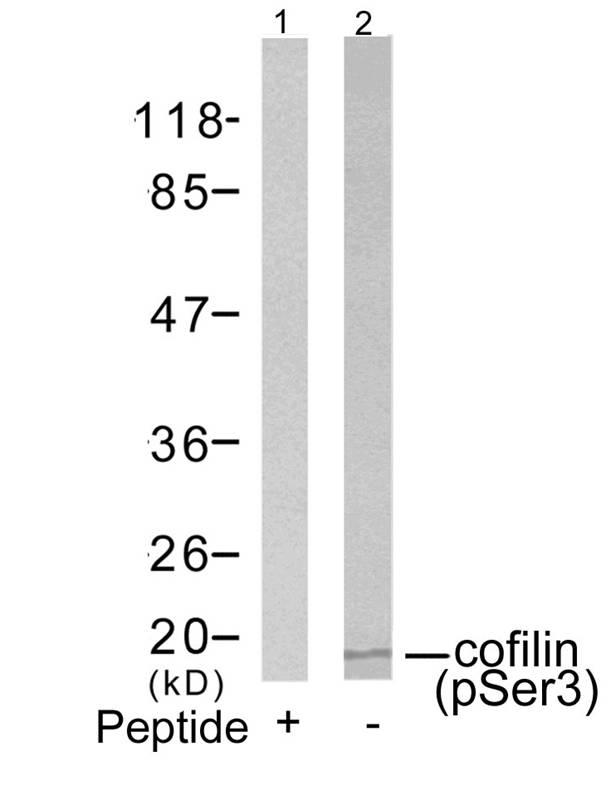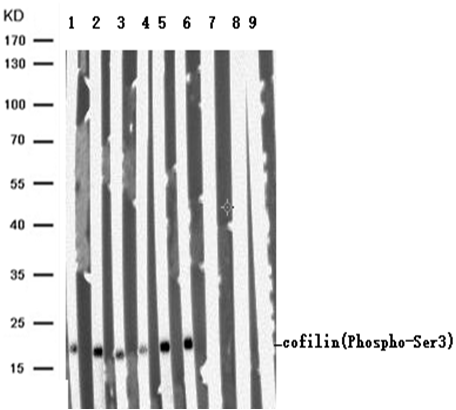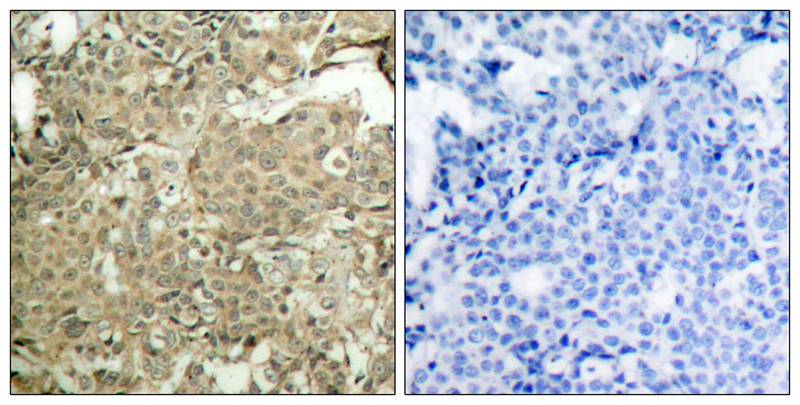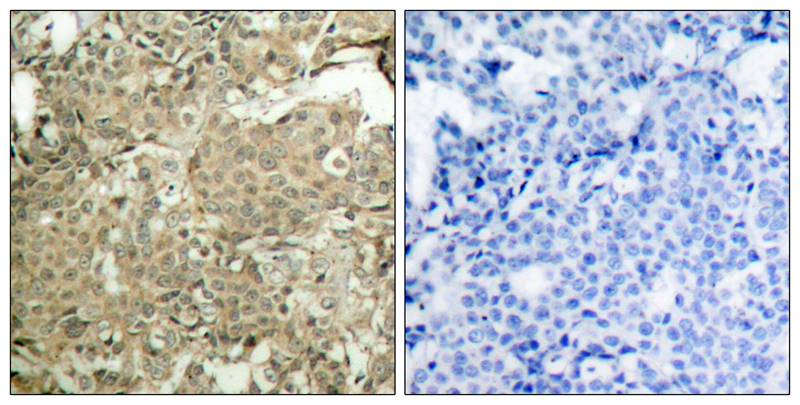



| WB | 咨询技术 | Human,Mouse,Rat |
| IF | 咨询技术 | Human,Mouse,Rat |
| IHC | 1/50-1/100 | Human,Mouse,Rat |
| ICC | 1/100-1/200 | Human,Mouse,Rat |
| FCM | 咨询技术 | Human,Mouse,Rat |
| Elisa | 咨询技术 | Human,Mouse,Rat |
| Aliases | CFL; CFL1; |
| Entrez GeneID | 1072; |
| WB Predicted band size | 19kDa |
| Host/Isotype | Rabbit IgG |
| Antibody Type | Primary antibody |
| Storage | Store at 4°C short term. Aliquot and store at -20°C long term. Avoid freeze/thaw cycles. |
| Species Reactivity | Human,Mouse,Rat |
| Immunogen | Peptide sequence around phosphorylation site of serine 3 (M-A-S(p)-G-V) derived from Human cofilin. |
| Formulation | Purified antibody in PBS with 0.05% sodium azide. |
+ +
以下是关于cofilin(Phospho-Ser3)抗体的3篇参考文献,简要总结如下:
---
1. **文献名称**:**"Regulation of the Actin Cytoskeleton by Phosphorylation of Cofilin on Serine 3"**
**作者**:Agnew et al. (1995)
**摘要**:该研究首次鉴定了cofilin在Ser3位点的磷酸化对其肌动蛋白解聚活性的抑制作用,并开发了特异性识别磷酸化Ser3的抗体,验证了其在细胞迁移中的调控作用。
2. **文献名称**:**"Cofilin Phosphorylation by LIM-Kinase 1 and Its Role in Rac-Mediated Actin Reorganization"**
**作者**:Yang et al. (2000)
**摘要**:通过使用Phospho-Ser3抗体,研究揭示了Rac信号通路通过激活LIMK1磷酸化cofilin(Ser3),从而调控神经元突触结构的重塑和突触可塑性。
3. **文献名称**:**"Phosphorylation of Cofilin Regulates Extracellular Matrix Degradation and Cancer Cell Invasion"**
**作者**:Wang et al. (2005)
**摘要**:该文献利用Phospho-Ser3抗体证明,肿瘤细胞中cofilin的磷酸化状态(失活态)与基质金属蛋白酶(MMPs)的分泌及癌细胞侵袭能力呈负相关。
---
这些文献均通过Phospho-Ser3抗体阐明了cofilin磷酸化在细胞骨架动力学、信号转导及疾病机制中的关键作用。如需具体引用格式或更多研究,可进一步补充。
Cofilin (Phospho-Ser3) antibodies are essential tools for studying the regulation of actin cytoskeleton dynamics, a critical process in cell motility, division, and signaling. Cofilin, an actin-binding protein, promotes actin filament depolymerization and severing, enabling cytoskeletal remodeling. Its activity is tightly controlled by phosphorylation at Serine 3 (Ser3), which inhibits its actin-binding ability. This phosphorylation is primarily mediated by LIM kinase (LIMK) and testicular kinase (TESK), while dephosphorylation by phosphatases like chronophin restores cofilin's activity.
Antibodies specific to phosphorylated Ser3 (pSer3) of cofilin allow researchers to detect and quantify the inactive form of cofilin in cells or tissues. These antibodies are widely used in techniques like Western blotting, immunofluorescence, and flow cytometry to investigate signaling pathways involving Rho GTPases, growth factors, or stress stimuli that regulate cofilin phosphorylation. Elevated pSer3-cofilin levels are associated with reduced actin turnover, impacting cell migration, cancer metastasis, and neuronal plasticity. Conversely, decreased phosphorylation correlates with enhanced cytoskeletal rearrangements, such as those seen in immune cell trafficking or neurodegenerative diseases.
The cofilin (pSer3) antibody is particularly valuable in studying pathological conditions, including cancer progression, Alzheimer's disease, and immune disorders, where dysregulated actin dynamics contribute to disease mechanisms. Its specificity for the phosphorylated epitope ensures precise monitoring of cofilin inactivation, making it a key reagent for dissecting cytoskeletal regulation in health and disease.
×